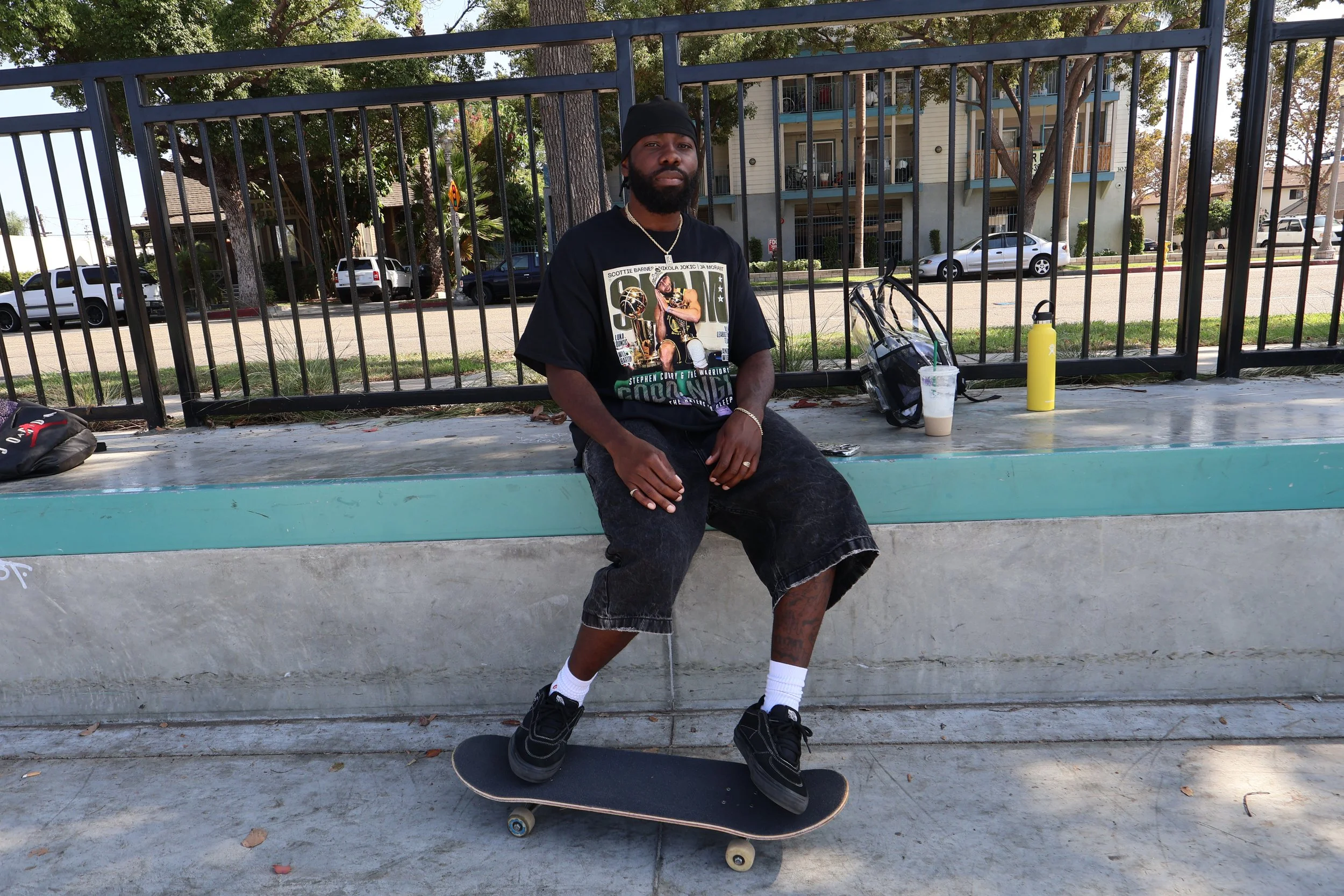TJ Harris explains how he got the best of both worlds with skateboarding
by Matthew Becerra
Long before TJ Harris was working for the Vans corporate office or getting clips with notable filmers like Kevin Perez, he was just a kid skating the streets of Orlando. Growing up in Florida, Harris and his brother were out on rollerblades and scooters before they found skateboarding. One day, a kid in the neighborhood pulled out a board and landed a kickflip, something Harris had never seen before. He was hooked immediately.
“I almost got an ollie within an hour,” Harris said. “It was addicting.”
For his birthday, Harris begged for a skateboard. His mom refused, calling it “a white thing.” But his aunt bought him one anyway, and by the time his birthday came, his mom had also surprised him with a board. Harris gave the second one to his brother, and the two never looked back.
In Orlando, Harris grew up with other local skaters like Tommy Bohn and Willie (454), filming park montages that grew into full-length videos. Contests around Florida gave him chances to test himself, and soon he was making finals and getting a glimpse into the industry.
“I’d never win, but I’d get top three or top five,” he said. “And I started realizing I was hanging with the big dogs.”
At Surf Expo, Harris caught the attention of a DC Shoes rep. For him, it felt surreal. “I was like, bro, this feels like a skate movie,” he said.
The message from peers was clear, to push further, he had to move to California. Harris eventually made the leap, but the transition wasn’t glamorous. He and his brother spent nights sleeping in cars and motels while trying to find their footing.
“It changed my life, but I wouldn’t do it again,” Harris said. “It was tough, but I believed that’s where the Lord wanted me, and that’s what kept me here.”
His faith had already shifted how he viewed skating. Just after he committed his life to Jesus, Harris entered Tampa Am for the second time. In practice, he landed everything. But when the contest started, he couldn’t stick anything.
“I remember looking up like, God, you played me,” Harris said. “But I took it as a sign. Maybe skating wasn’t supposed to be my whole life.”
Instead of giving up, Harris let go of the pressure. That perspective carried him forward. “After I stopped chasing it so hard, I felt like God gave it back to me in the perfect way,” he said.
Harris needed work, and like many skaters, he found it through Vans. He started as a skatepark attendant at the Huntington Beach park, working shifts that blended customer service with cleaning and keeping the park running. Over the years, he moved up to supervisor, then assistant store manager.
When an apprenticeship program at Vans’ corporate office opened, a friend encouraged him to apply. The process felt daunting. “It was like getting into the FBI,” Harris joked.
Multiple interviews, competing against candidates with degrees and internships. Harris had neither. But what he did have was experience in skating, relationships, and a reputation for treating people with respect.
He got the job, today, his role bridges the gap between designers and stores, planning release dates, and making sure shoes hit the floor in ways that make sense.
“I’m in meetings with notable people in the industry, it’s crazy.” Harris said
At 35, Harris balances skating, work, and fatherhood. Skating isn’t every day anymore. Instead, it’s weekends, trips, or filming a clip for a friend’s project. He battles tricks more than he used to, but he’s okay with that.
“Back in the day, if I didn’t land something, I’d be heated all night,” he said. “Now, if I don’t get a clip, I go home to my son. That perspective changes everything.”
Corporate life has its perks. A stable salary, weekends off, benefits — luxuries many pros don’t have.
“Unless you’re Nyjah or P-Rod with some crazy contract, skating isn’t sustainable forever,” Harris said. “Even some pros now have side hustles.”
For Harris, the stability of Vans and the freedom to skate when he wants is a balance he values. He still travels, still gets boards through long-time connections, and even collaborates with brands. He still feels part of the culture — just without the pressure of making skating his livelihood.
Harris calls his life the best of both worlds. He’s still deeply tied to skating, but he doesn’t depend on it to pay his bills. He’s built a career around the culture.
“I love skating, but I can’t killing myself on a ten-stair every weekend,” Harris said. “This way, I still get to skate, still be involved, but also provide for my family. That’s the best of both worlds.”
It’s a path he believes more skaters will have to find as the industry shifts and contracts shrink. “If your whole lifestyle depends on how many clips you get, that’s stressful,” Harris said. “But if you can find a way to stay in skating, provide for yourself, and still love what you do — that’s the best of both worlds.”

